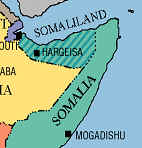 Here's a telling irony. We think of Somalia as a country that has basically had no functioning government for over a generation, and is beset by insurgents linked to al-Qaeda. Certainly, how a government treats a relatively harmless psychoactive herb is a good barometer of its general commitment to freedom. The herb in question here is khat, the mildly stimulating leaf that is chewed socially throughout the Horn of Africa. And we've noted how even the weak "official" government in Somalia has been cracking down on khat in a bid to appease the Shabaab insurgents.
Here's a telling irony. We think of Somalia as a country that has basically had no functioning government for over a generation, and is beset by insurgents linked to al-Qaeda. Certainly, how a government treats a relatively harmless psychoactive herb is a good barometer of its general commitment to freedom. The herb in question here is khat, the mildly stimulating leaf that is chewed socially throughout the Horn of Africa. And we've noted how even the weak "official" government in Somalia has been cracking down on khat in a bid to appease the Shabaab insurgents.
But what we call "Somalia" is actually divided into (at least) three political entities. The "official" (internationally recognized) government based in Mogadishu is basically a fiction, and even the southern third of the country nominally under its control actually contains large areas of Shabaab control. To the north, at the very tip of the Horn of Africa, lies Puntland—an autonomous zone which has stopped short of actually declaring independence, although it is practically independent in all but name. And to the west of Puntland, on the north coast of the Horn, is Somaliland—an autonomous enclave that has actually declared independence.
And (surprise!), the area controlled by Somalia's "government" is war-torn and dominated by conservatives who castigate khat; autonomous Puntland more liberal and open as well as more stable; and independent Somaliland a virtual liberated zone in the whole Horn of Africa region—secular, embracing modernity, and apparently quite tolerant of khat.
A BBC Future feature on Sept. 13 boasts that Somaliland is "the surprising place where cash is going extinct." With the Somaliland shilling extremely devalued (partly due to the government's unrecognized status), nearly all commerce is now done on smart phones. And the commodity they chose to profile—sold openly from street stalls in Hargeisa, the enclave's capital—is none other than khat.
Writes BBC: "Customers quickly come and go, grabbing bundles of the green leafy, legal plant that they deem good enough before punching digits into phones and disappearing as quickly as they came."
A khat vendor named Omar is amusingly quoted: "We need to do everything quickly, and paying with cash here is slow. It keeps people calm if they can get their khat quickly."
Mogadishu last year attempted to ban khat imports (the stuff is grown in more fertile Kenya and Ethiopia), although authorities were forced to overturn the order due to popular protest.
The Shabaab, of course, see khat as the devil's weed, and will kill you for chewing the stuff. On Sept. 1, Shabaab insurgents made a rare attack in Puntland—setting off two bombs in a shop that was selling khat. Two local militiamen, who were there to purchase khat for upcoming Eid al-Adha celebrations, were killed in the attack.
Meanwhile in Somaliland, there is virtually no Shabaab presence, and khat is seen as just another legal commodity. Maybe this is the government the world should be recognizing, not the fictional and reactionary one in Mogadishu.
Cross-post to High Times
Image via Government of Somaliland







Recent comments
1 week 2 days ago
1 week 2 days ago
4 weeks 3 days ago
5 weeks 2 days ago
9 weeks 2 days ago
13 weeks 1 day ago
17 weeks 1 day ago
17 weeks 6 days ago
27 weeks 6 days ago
32 weeks 9 hours ago